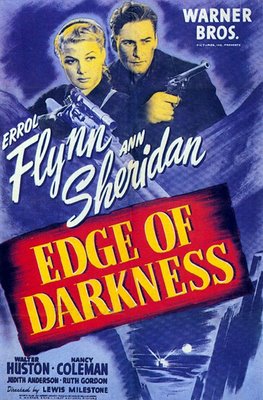
EDGE OF DARKNESS
US, 1943, 124 minutes, Black and white.
Errol Flynn, Ann Sheridan, Walter Huston, Judith Anderson, Ruth Gordon, Nancy Coleman, Helmut Dantine, Morris Carnovsky, Charles Dingle, John Beal.
Directed by Lewis Milestone.
Edge of Darkness is one of many war stories, propaganda material, made by Warner Bros. in the early '40s. Several starred Errol Flynn, Northern Pursuit, Desperate Journey, Objective Burma.
The film was directed by Lewis Milestone, Oscar winner for All Quiet on the Western Front and maker of many memorable war films including A Walk in the Sun. This film focuses on Norway, the Norwegian Resistance, Nazi occupation, the hopes for British liberation.
On Hollywood sets, the film re-creates an atmosphere of a Norwegian town, the range of people, the pressures of occupation. There is a strong star cast. Errol Flynn is somewhat overshadowed by Walter Huston and Ann Sheridan. Interesting character actors amongst the supports are Judith Anderson and Ruth Gordon. Helmut Dantine is, yet again, the German soldier. The film is stirring in its way - and is one of the more interesting war propaganda films that continues to be entertaining decades after.
1, Images of World War Two? The war in Europe? Nazi occupation? Resistance? The film as propaganda? Impact now?
2. The work of Lewis Milestone, his career in making war films? Warner Bros. production values, cast? The black and white photography? The insertion of speeches from Churchill-~and Roosevelt? A stirring ending?
3. Black and white photography, the Warner Bros. back lot re-creating Norway? Life in a Norwegian town, resistance, battles? Musical themes and score?
4. The title, Nazi oppression, the war effort?
5. The structure of the film: the situation in the town, the puzzle, the dead bodies, the flashback and the story, the heroism emerging, the resistance against the Nazis and their destruction?
6. Audience familiarity with German occupation at the time, Norway, the invasion, occupation, treatment of people, difference of beliefs, the resistance, allies with the British?
7. The detail of the life of the town, families, factories, the Germans ruling, the collaborators, the meetings in the church, civic, groups, the minister and his sermons, business? The townspeople being united in resistance? The decisions made, the processes, the Resistance and its effect? The massacre? The final resolution?
8. The doctor as the focus of the town? As a character in himself, his family, troubles, his wife and her support, Karen and her strong stances, Johann and his return from Oslo, collaboration, betrayal? His caution, the meetings in the church, his agreeing with the plans, the treatment of Karen and his anger, killing the Nazi, the beginning of the resistance, his participation in the battles? His being a symbol of the resistance?
9. Gunnar's fisherman, leader, the organisation, the church meeting, heroism, relationship with Karen, anger at her mistreatment, his being persuaded to keep calm, the siege, the attack, his leadership at the end?
10. Karen as heroine, her relationship with her father, Gunnar, suspicions of Johann, her participation in the action, her being maltreated, her place in the final attack?
11. Johann as her brother, Oslo and collaboration, return, suspicions, the pressure of the Nazis, his finding out information and passing it on? His final saving of the group attacking, his death?
12. The various villagers and their participation, Judith Anderson as the resistance leader, the hotel, the death of her father, attraction towards the German soldier, careful, active, a strong woman?
13. The portrait of the Germans - the leader, his dominance,-expectations, collaboration, the girl in the hotel, her death? The attack, his disillusionment, final letter, (propaganda)? His men, as occupation soldiers, brutality? The Germans coming to the relief of the town - and what they found, their reports?
14. The doctor's wife and her brother, his owning the factory, his wealth, collaboration, Johann - and the pathos of his death by the Germans?
15. The film's attention to character detail, the atmosphere of the town, the presentation of Nazis, the nature of resistance in war, the justness of the cause, heroism?